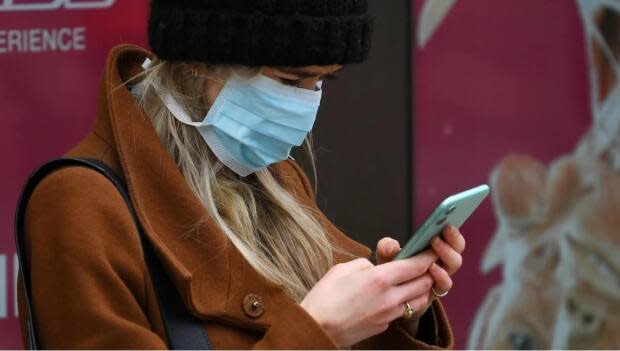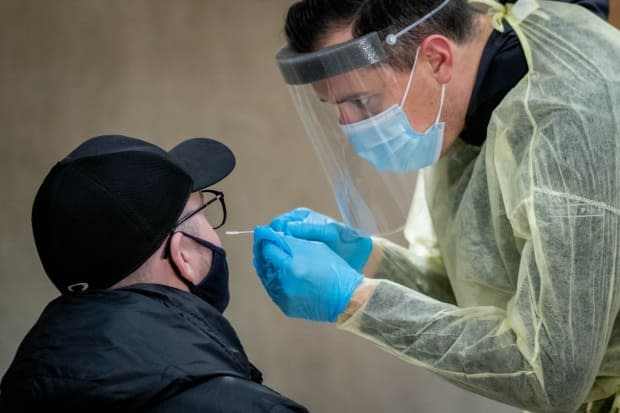Sask. Health Authority recruiting volunteers, retirees for COVID-19 contact tracing
The Saskatchewan Health Authority is recruiting retirees and volunteers to help with contact tracing investigations, according to a health authority spokesperson.
The SHA has more than 350 staff trained for contact tracing, the spokesperson said. But as COVID-19 cases and the number of close contacts rise, the investigations take longer to conduct.
So the health authority is recruiting more contact tracers, including retirees and volunteers, in anticipation of a potential surge in cases.
"Our contact tracing system is certainly under strain," health authority CEO Scott Livingstone said during a news conference Thursday.
"A single positive case each and every day provides hours of work for contact tracers over the two-week time period" after a positive result, he said. "But that work can grow exponentially when you factor in the number of contacts."
As of Thursday, Saskatchewan averaged 214 new COVID-19 cases per day over a two-week period. Each case had about seven or eight close contacts on average, which creates 32,000 total hours of work over the two-week period, said Livingstone.
He noted that the average number of contacts is down slightly from recent weeks, but the health authority is planning an effective contact tracing strategy in case the province approaches 450 cases per day.
Early in the pandemic, the provincial government authorized retired nurses to obtain emergency licences through the Saskatchewan Registered Nurses Association, the regulatory body for the province's nurses. The most recent licence was issued Thursday.
The association is working with the health authority on the workforce plan, and shares its emergency practice licence list every week with the SHA "and other employers," an association spokesperson said.

Once nurses retire, they are no longer part of the Saskatchewan Union of Nurses. But if issued an emergency licence, they are unionized temporarily, said SUN president Tracy Zambory.
"It is just extremely important that the resources are given to [contact tracing] that it requires," she said.
"It's about resumption of health-care services, and pulling back on some of the slower areas so that the human resources can be freed up to be able to assist in contact tracing."
'Real consequences'
Contact tracing aims to identify COVID-19 cases before they can unknowingly spread the illness throughout the community, explains Dr. Cory Neudorf, a public health physician and University of Saskatchewan professor of community health and epidemiology.
Finding close contacts means they can self-isolate and be tested sooner.
"You interrupt that chain of transmission, and you can start to get a handle on the pandemic," he said.
The health authority's announcement that contact tracing investigations are taking longer signifies that Saskatchewan residents are not following public health rules as closely as they should be, or that COVID-positive people are visiting public spaces, says Neudorf.
Time-consuming investigations can also make it tougher to find contacts and curb the spread of COVID-19, because people may forget who they met and where they went over time, he said.
But the strain on contact tracing also has consequences for the overall health-care system as well, Livingstone said Thursday.
A finite number of workers are trained to do contact tracing, so some health-care workers have been moved around the health-care system to conduct investigations. But that is only a Band-Aid solution, says Neudorf.

"As the outbreak progresses, and you start getting a lot of COVID-19 cases in the hospital, those workers need to be brought back to care for the COVID-positive patients," he said. "You can't be using the same stuff for both purposes, so that's only a short-term fix."
Redeploying staff also causes disruptions in other health-care services, he added.
Saskatchewan residents can help reduce the length of contact tracing investigations by only going out in public for essential reasons, regardless of what the province's public health rules allow, to reduce the number of close contacts, Neudorf said.
When people do go out, they should mind physical distancing and wear a mask, he added.
Neudorf also suggests keeping a weekly list of where you go, who you see and when, especially if you have to be in public often. Such lists help tracers easily track contacts down, should a person test positive.
As of Friday, 2,237 COVID-19 cases in Saskatchewan are under investigation by public health officials.

 Yahoo Movies
Yahoo Movies 
